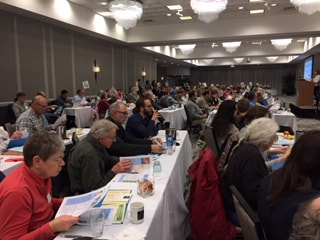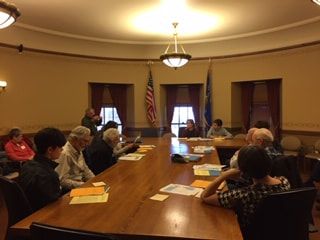|
Organized by a consortium of Wisconsin conservation groups, hundreds of water quality activists let the Wisconsin Legislature hear that voices by speaking directly to lawmakers, in the Capitol building itself. “Clean Water Lobby Day” was held on the afternoon of January 30 in Madison. LWV UMRR Board member Carolyn Mahlum-Jenkins was among those who got briefed in information sessions and then hit the halls of the Capitol with water conservation messages.  Photo: Carolyn Mahlum-Jenkins Photo: Carolyn Mahlum-Jenkins This was a timely event, because the Speaker's Water Task Force just released its findings and draft bills after a year of work. The Speaker's Task Force on Water Quality was created to gather information and make policy recommendations to better assess and improve the quality of both surface water and ground water in our state. Areas of study included identifying the best practices for soil mapping and data collection, determining the sources of contaminants, assessing runoff management, investigating remedies that will protect a healthy and stable supply of water, and supporting best practices for designing and constructing wells and septic systems. This story from WSAW-TV in Wausau describes the package of bills in the Speaker's Task Force on Water Quality as including:
A bill to revise the Well Compensation Grant Program to address nitrate contamination by increasing the fund by $1 million for next fiscal year, remove the restrictions for compensation when a well is only contaminated by nitrates, and, among other things, provides the DNR with one full-time position for the grant program. Another bill creates a pilot program to address nitrate contamination, which includes creating another grant this time for agricultural producers, including university entities, “to implement projects, for at least two growing seasons, that reduces nitrogen loading or uses nitrogen at an optimal rate while protecting water quality…” Several other bills address farming, as it relates to water contamination, and ways to help farmers reach goals of environmentally-friendly practices. This includes a bill that is multifaceted that would provide assistance to farmers for conservation, with recommendations for grant expansions and insurance coverage. UW-Stevens Point’s Watershed Science and Education program also was acknowledged in the package for its work in testing, mapping, and educational outreach. One bill would expand on the university’s work by providing $450,000 per year to the program, along with create a hydrogeologist position within the Wisconsin Geological and Natural History Survey, among other recommendations. Another bill would create an office of water policy within the Wisconsin Geological and Natural History Survey. This person would be appointed by the governor and be required to evaluate the current laws and rules, any proposals, and make recommendations about water policy, along with submit a report to the legislature every other year. Other bills include: - Increasing funding for county conservation staff, which Testin said he is the lead author of - Require the DNR to have a public comment period when establishing groundwater standards - Create a pilot program to address nitrate contamination - Provide extra funding for the Freshwater Collaborative undergraduate program to help train the next generation of scientists and attract talent by studying the challenges of agriculture management and the challenges of water quality and safety - Expand the PFAS program so DATCP can collect firefighting foam and either store or dispose of that foam - Extend the Wisconsin fund for septic systems for two more years, requires the Department of Safety and Professional Services write and distribute the eligibility requirements for the grant program, and fund DSPS with two full-time project positions - Alter the rules and application process for the wetlands and floodplain restoration grants - Require the DNR to provide grants to local water improvement groups to conduct projects using biomanipulation or deliberately removing or adding certain fish to reduce phosphorus and nitrogen in water - Prohibit the Sale or Use of Coal Tar-Based and PAH Sealant Products
0 Comments
Leave a Reply. |
| LWV Upper Mississippi River Region | UMRR blog |

 RSS Feed
RSS Feed